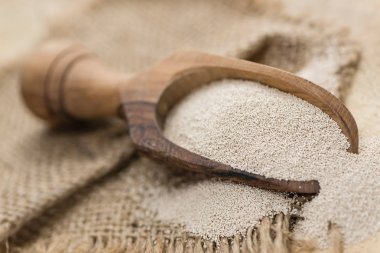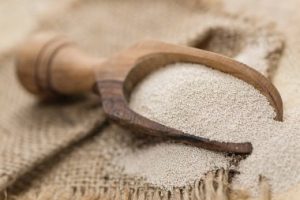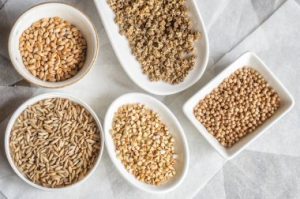
Is Nutritional Yeast Gluten Free (8 Important Facts)
Is nutritional yeast gluten-free, making it a versatile and safe option for individuals with gluten sensitivities or celiac disease? In the kaleidoscope of dietary preferences and culinary inquiries, one question that often emerges with a burst of curiosity is whether nutritional yeast pirouettes gracefully in the gluten-free realm.
Picture a dazzling symphony of flavors, a sprinkle of golden fairy dust on your favorite dishes – but does this culinary enigma carry the elusive gluten-free passport? Let’s embark on a flavorful journey through the cosmos of nutritional yeast, unraveling the mysteries that lie within its delicate, golden flakes, and discover whether it is truly a gluten-free virtuoso or a silent saboteur of gluten-sensitive palates. Brace yourself for a culinary odyssey where the question isn’t just about nutritional yeast; it’s about savoring the freedom of a gluten-free gastronomic adventure.

Is Nutritional Yeast Gluten Free
Yes, nutritional yeast is typically gluten-free.
Nutritional Yeast Overview
Nutritional yeast has gained popularity as a versatile and flavorful ingredient, often used to enhance the taste of various dishes. One common question among health-conscious individuals and those with gluten sensitivities is whether nutritional yeast contains gluten. The good news is that nutritional yeast is inherently gluten-free.
Understanding the Gluten-Free Nature
Nutritional yeast is a deactivated yeast, typically Saccharomyces cerevisiae, grown on molasses. It is a rich source of vitamins, minerals, and protein, making it a popular choice for vegetarians and vegans. Importantly, the manufacturing process of nutritional yeast involves carefully selected strains of yeast that do not involve gluten-containing grains.
Versatility and Popularity
Apart from its gluten-free nature, nutritional yeast is celebrated for its versatility, offering a cheesy and nutty flavor profile.
Integrating Nutritional Yeast into Gluten-Free Diets
For those following gluten-free diets, nutritional yeast serves as an excellent addition to recipes, providing a savory kick without compromising dietary preferences.
Understanding Nutritional Yeast
Nutritional yeast, a savory and versatile culinary ingredient, is celebrated for its distinctive production process and rich nutritional profile. In the cultivation phase, Saccharomyces cerevisiae, a species of yeast, undergoes meticulous nurturing to ensure optimal growth. This yeast is then deactivated and harvested, paving the way for the transformation into the familiar flakes or powder form through careful processing.
Renowned for its robust nutritional content, nutritional yeast stands out as a powerhouse of essential elements. With an impressive protein content, it serves as a valuable plant-based protein source, appealing to those seeking alternative protein options. Moreover, its abundance in B-complex vitamins, such as B1, B2, and B3, adds a healthful dimension to dishes, contributing to energy metabolism and overall well-being.
In addition to its protein and vitamin profile, nutritional yeast boasts a spectrum of minerals, including zinc and selenium, vital for immune function and antioxidant defense. Its notable dietary fiber content further enhances its nutritional appeal, promoting digestive health and satiety.
With its unique production journey and unparalleled nutritional benefits, nutritional yeast has become a staple in various diets. Whether described as a vegan cheese substitute, a flavor enhancer, or a superfood seasoning, the versatile applications of nutritional yeast resonate with health-conscious individuals and culinary enthusiasts alike, making it an indispensable pantry item. Elevate your dishes with the goodness of nutritional yeast – a flavorful and nutrient-packed addition to your culinary repertoire.
Gluten and Nutritional Yeast
Gluten Definition
Gluten is a complex mixture of proteins found in wheat and other grains, contributing to the elastic texture of dough. Comprising gliadin and glutenin, gluten plays a crucial role in giving structure to baked goods.
Sources of Gluten
Wheat
Wheat, a staple in many diets, is a primary source of gluten. Its gluten content contributes to the chewiness of bread and the elasticity of pasta.
Barley
Barley, commonly used in malting and brewing, contains gluten. It is a key ingredient in various food products, including cereals and soups.
Rye
Rye, another grain rich in gluten, is often used in bread and whiskey production. Its gluten content adds to the unique texture and flavor of these products.

Nutritional Yeast Composition
Lack of Wheat, Barley, or Rye
Nutritional yeast stands out for being gluten-free. Unlike traditional yeast, it does not contain wheat, barley, or rye, making it a safe option for those with gluten sensitivities.
Gluten-Free Certification
Nutritional yeast is often labeled with a gluten-free certification, assuring consumers that it meets strict standards. This makes it a versatile choice for enhancing flavors in various dishes, especially for those adhering to gluten-free diets.
In the realm of gluten and nutritional yeast, understanding the sources of gluten—wheat, barley, and rye—is vital for those navigating gluten-related dietary restrictions. Nutritional yeast, with its distinct composition devoid of these grains, provides a gluten-free alternative backed by certifications. Whether you’re a gluten-conscious consumer or exploring flavorful, gluten-free options, these insights shed light on the unique characteristics of gluten and nutritional yeast.
Certifications and Labeling
Certifications and labeling play a crucial role in ensuring food safety and meeting specific dietary needs. In the realm of gluten-free products, individuals often rely on reputable organizations for assurance. The Gluten-Free Certification Organization (GFCO) and the National Celiac Association stand out as trustworthy entities, instilling confidence in consumers seeking gluten-free options. These certifications carry significant weight, assuring shoppers that products have undergone rigorous testing and adhere to stringent gluten-free standards.
When navigating the world of gluten-free choices, understanding how to read labels becomes essential. Unveiling the intricacies of product packaging is a skill that involves identifying ingredients to avoid, such as wheat, barley, and rye derivatives.
This step is pivotal in ensuring a genuinely gluten-free experience. Additionally, consumers must be vigilant about cross-contamination risks. As the demand for gluten-free options rises, staying informed about certifications and label nuances becomes instrumental in fostering a gluten-conscious lifestyle.
Common Concerns and Misconceptions
Cross-Contamination in Production Facilities
Shared Equipment
In the realm of food production, shared equipment poses a significant concern for cross-contamination. Manufacturers often use the same machinery to process various products, increasing the risk of allergen transfer. To mitigate this, diligent cleaning protocols and dedicated production lines are crucial.
Production Practices
Misconceptions about cross-contamination often arise due to inadequate understanding of production practices. Strict adherence to hygiene standards, segregation of ingredients, and rigorous quality control measures are essential to dispel concerns related to cross-contamination in production facilities.
Contaminated Brands
Researching Trusted Brands
When it comes to avoiding contaminated products, diligent brand research is paramount. Consumers must delve into the sourcing practices and quality standards of brands they consider.
Customer Reviews and Feedback
Unraveling the truth behind product safety often lies in customer reviews and feedback. In navigating concerns surrounding cross-contamination and contaminated brands, awareness and scrutiny play pivotal roles. Understanding the intricacies of production processes and researching brands meticulously can empower consumers to make informed choices, fostering a safer and more reliable market.
Benefits of Nutritional Yeast in Gluten-Free Diets
Elevate your gluten-free dishes with the culinary magic of nutritional yeast, a versatile flavor enhancer that brings a savory, cheese-like profile to your meals. As a gluten-free alternative, it seamlessly integrates into various recipes, offering a satisfying umami taste that resonates with those seeking a palatable substitute for traditional ingredients.
Transform your gluten-free meals into a powerhouse of nutrients by incorporating nutritional yeast. Packed with essential vitamins and minerals, this yeast acts as a nutritional booster, enhancing the overall health benefits of your gluten-free diet. Elevate the nutrient density of your favorite dishes effortlessly, satisfying both your taste buds and your body’s nutritional needs.
Unlock the B-vitamin treasure trove for your gluten-free lifestyle with nutritional yeast. This remarkable ingredient is a rich source of B-vitamins, including B12, a nutrient often challenging to obtain from plant-based sources. Seamlessly integrate this powerhouse into your gluten-free diet to ensure you’re not only savoring delicious meals but also meeting your body’s crucial B-vitamin requirements. Boost your well-being with every flavorful bite.

Potential Risks of Nutritional Yeast
Possible Allergic Reactions
Definition of Allergies
Allergies are immune system responses to substances that are generally harmless but trigger an abnormal reaction in sensitive individuals. In the context of nutritional yeast, understanding potential allergic reactions is crucial for those incorporating it into their diets.
Common Allergens in Nutritional Yeast
Histamine
Some individuals may experience allergic responses due to elevated histamine levels in nutritional yeast, leading to symptoms like skin rashes and digestive discomfort.
Tyramine
Tyramine, another potential allergen in nutritional yeast, can induce adverse reactions in susceptible individuals, emphasizing the importance of awareness in consumption.
Glutamate
Sensitivity to glutamate, a naturally occurring component in nutritional yeast, can manifest in various allergic symptoms, underscoring the need for cautious consumption.
Symptoms of Allergic Reactions
Skin Rash
Allergic reactions may manifest as skin rashes, itching, or redness, prompting individuals to be vigilant about any adverse dermatological changes.
Digestive Issues
Some may experience digestive discomfort, such as bloating or stomach cramps, signaling a possible allergic response to nutritional yeast and the need for alternative dietary choices.
Respiratory Problems
Allergic reactions involving the respiratory system can lead to symptoms like sneezing, coughing, or shortness of breath, necessitating immediate attention and allergen avoidance. By understanding these potential allergens and symptoms associated with nutritional yeast consumption, individuals can make informed choices, fostering a healthier relationship with this popular food product.
Risk of Excessive Intake
Nutritional yeast, celebrated for its savory flavor and nutritional profile, poses risks when consumed excessively, particularly as a fortified food. The incorporation of synthetic nutrients, while enhancing its nutritional value, raises concerns about overconsumption. Individuals may unknowingly exceed recommended levels, leading to potential health issues.
B vitamins, such as B6, B12, and folate, abundant in nutritional yeast, present a risk of vitamin overdose when consumed in excess. This risk is compounded by the possibility of niacin (B3) overdose, causing flushing. Balancing the benefits of fortified foods with an awareness of potential risks is crucial for maintaining optimal health.
Contamination Risks
Contamination risks pose a formidable challenge across various industries, with microbial contamination and heavy metal contamination standing out as critical concerns. In the realm of microbial contamination, the introduction of harmful bacteria or fungi can jeopardize product integrity and public health. Employing stringent storage and handling practices is crucial, emphasizing the importance of maintaining sterile environments and adhering to hygienic protocols.
Similarly, heavy metal contamination presents a distinct threat, often stemming from the absorption of toxic elements by plants from their growing medium. This can compromise the safety of food products and agricultural produce. Implementing rigorous testing and quality assurance measures becomes imperative to mitigate these risks, ensuring that products meet stringent safety standards. Regular testing for heavy metals in soil and water, coupled with meticulous quality control practices, becomes the bulwark against potential contamination.
Interaction with Medications
Navigating Yeast and Antifungal Medications
Embarking on a journey with yeast and antifungal medications requires a nuanced approach. Candidiasis, a common yeast infection, demands antifungal agents for resolution. These medications, pivotal in yeast control, encompass diverse formulations like creams, oral tablets, or intravenous solutions. Users often seek relief from persistent itching, discomfort, and inflammation. Understanding the intricate balance between yeast and antifungal medications is crucial for effective treatment.
Unraveling the Potential for Medication Interference
In the realm of healthcare, awareness of potential medication interference is paramount. Interactions may alter the intended effects of medications, resulting in adverse outcomes. Users frequently express concerns about drug combinations, side effects, and the efficacy of their treatment. Identifying potential interference points ensures a smoother medication experience. Stay informed about possible interactions to safeguard your well-being.
Empowering Through Consultation with Healthcare Professionals
Empower your health journey through insightful consultation with healthcare professionals. Patients often share their experiences seeking guidance on medication management. Effective communication with healthcare providers involves discussing concerns, clarifying doubts, and ensuring personalized care. Professionals play a pivotal role in addressing medication-related queries, promoting patient confidence, and fostering a collaborative approach to well-being.
Considerations for Specific Populations
Considerations for specific populations, such as pregnancy and nutritional yeast, require careful attention to ensure optimal health outcomes. Folate intake during pregnancy is paramount, and nutritional yeast can be a valuable source. Adequate folate levels aid in fetal development and prevent neural tube defects, making it essential for expectant mothers. However, excessive intake may pose risks, emphasizing the need for balance in consumption. Pregnant women should consult healthcare providers for personalized guidance, navigating the fine line between sufficiency and excess.
When exploring nutritional yeast and autoimmune conditions, it’s crucial to understand the potential impact on individuals with autoimmune disorders. While nutritional yeast is often praised for its nutrient content, its effects on autoimmune conditions may vary. In this context, consulting healthcare providers becomes imperative. Individuals managing autoimmune conditions should seek professional advice to tailor their diet and ensure that nutritional yeast inclusion aligns with their overall health goals.
Incorporating Nutritional Yeast into a Gluten-Free Diet
Incorporating nutritional yeast into a gluten-free diet opens up a world of savory possibilities, satisfying both taste buds and nutritional needs. Elevate your plant-based cuisine with a delectable Gluten-Free Vegan Cheese, crafted with the cheesy umami goodness of nutritional yeast. This dairy-free alternative boasts a rich, creamy texture that rivals traditional cheese, making it a must-try for vegan enthusiasts and those with gluten sensitivities alike.
For a nutrient-packed side dish, indulge in Nutritional Yeast Seasoned Vegetables—roasted to perfection with a sprinkle of this yeast, creating a flavor explosion that resonates with health-conscious foodies. Dive into the realm of comforting indulgence with Gluten-Free Pasta adorned with the nutty, cheesy notes of nutritional yeast, delivering a wholesome twist to classic Italian fare.
Frequently Asked Questions (FAQ) about Is nutritional yeast gluten free
Q1: Is nutritional yeast gluten-free?
A1: Yes, nutritional yeast is naturally gluten-free. It is a deactivated yeast that doesn’t contain gluten.
Q2: What is nutritional yeast made from?
A2: Nutritional yeast is made from a single-celled organism called Saccharomyces cerevisiae, which is grown on molasses and then deactivated through a heating process.
Q3: Can individuals with gluten sensitivity or celiac disease consume nutritional yeast?
A3: Yes, nutritional yeast is generally safe for individuals with gluten sensitivity or celiac disease, as it does not contain gluten.
Q4: Are there any cross-contamination risks with gluten in nutritional yeast?
A4: It’s essential to check product labels, but reputable nutritional yeast brands typically follow strict manufacturing processes to avoid cross-contamination with gluten.
Q5: Can nutritional yeast be used as a substitute for gluten-containing ingredients in recipes?
A5: While nutritional yeast can add a savory, cheesy flavor to dishes, it doesn’t provide the same structural properties as gluten-containing ingredients, so it may not be an ideal substitute in all recipes.
Q6: Are there specific nutritional yeast brands that are certified gluten-free?
A6: Yes, some brands offer certified gluten-free nutritional yeast. Look for products with a gluten-free certification on the packaging for added assurance.
Q7: Does the nutritional content of nutritional yeast vary between gluten-free and non-gluten-free versions?
A7: The nutritional content remains similar between gluten-free and non-gluten-free versions of nutritional yeast, as gluten is not a significant component in its composition.
Q8: Are there any gluten-related concerns with flavored or seasoned nutritional yeast products?
A8: Flavored or seasoned nutritional yeast products may contain additional ingredients, so it’s crucial to check labels for gluten-containing additives. Pure nutritional yeast is gluten-free.
Q9: Can nutritional yeast be included in a gluten-free diet for added nutrients?
A9: Absolutely! Nutritional yeast is a great source of vitamins, minerals, and protein and can be a valuable addition to a gluten-free diet for both flavor and nutritional benefits.
Q10: How can I ensure that the nutritional yeast I purchase is gluten-free?
A10: To ensure gluten-free nutritional yeast, look for products with explicit gluten-free labeling or certification. Additionally, check the ingredient list for any potential gluten sources and be cautious of cross-contamination warnings.
Conclusion
In conclusion, nutritional yeast stands out as a versatile and popular ingredient in many kitchens, especially among those seeking a plant-based diet. One of its key attributes is its gluten-free nature, making it a safe and flavorful option for individuals with gluten sensitivity or celiac disease. With its rich source of nutrients, including B vitamins and protein, nutritional yeast not only enhances the taste of various dishes but also contributes to a well-rounded and health-conscious dietary choice.
As always, individuals with specific dietary concerns should consult with healthcare professionals or nutritionists to ensure that nutritional yeast aligns with their unique dietary needs. Overall, the gluten-free status of nutritional yeast adds to its appeal, offering a savory and nutritious option for a diverse range of culinary preferences.